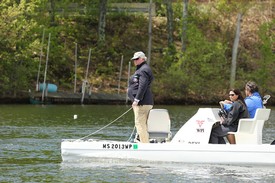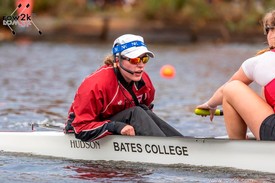
A discussion among some successful rowing coaches with teenagers led to the discovery that all had shut down cellphone use on the drive to their kids' sports practices and games, as otherwise the kids were in a nearly complete daze when they got out of the car.
Music in the headphones was fine, but video games, YouTube, doomscrolling, and other dopamine-inducing apps on the phone were out; otherwise we found that the first 15 minutes of warmup or practice were almost useless.
"They were out of it; almost couldn't get themselves over to the field!"
Many parents have seen the same - it doesn't take a seasoned coach to recognize a player who is not ready to play. As it turns out, to the surprise of very few coaches and parents (and athletes as you will read), research confirms that the screentime haze is very real.
A report by Malaysian educators and sports scientists Kim Geok Soh, Samsilah Roslan, Mohd Rozilee Wazir Norjali Wazir, and Kim Lam Soh titled Does mental fatigue affect skilled performance in athletes? A systematic review tries to find a consensus among various different studies regarding effect of performing cognitive tasks before engaging in skill and performance sports including soccer, basketball, and table tennis.
The researchers found that athletic performance, and particularly skilled performance, was negatively affected by cognitive tasks of many types, significantly and specifically including video games, social media scrolling, and other smartphone uses, as well as well-known 'lab' tests such as the Stroop test, a word and color test that pairs the word for a color with a mismatched font color - so the word Blue might be shown in orange lettering, and the subject is asked to name the color of the word, not the word.
Perception of Effort is Most Affected; Task Speed Maintained but Accuracy Declined; Age-Related Factors
The details of the paper are interesting in several regards; among other observations:
- One theory of the effects of cognitive fatigue on performance attributed decline to a reduction in motivation as well as perception of effort. The paper found that motivation had not actually declined, but perception of effort increased after the cognitive tasks.
For rowers, this may be the most significant data point; if what feels like 'full pressure' is some number of percentage points off, you could be significantly slower, especially in the boat when you don't have clear, individual splits to show you are off pace.
![]()
- The speed to complete tasks was not affected, but skill levels were; However, fatigued athletes were seen to slow down when about to perform a task requiring skill, sometimes allowing opponents to capitalize.
For example, soccer players made the same number of passes when fatigued, but made more errors and fewer perfect passes.
For soccer defenders, they had the same number of total tackles, but significantly fewer successful tackles. This may be related to another finding in the study where players were less aware of where their own teammates were on the field as compared to their opponents due to 'visual search strategy' being affected (coxswains take note!).
In basketball, turnovers increased among the mentally fatigued subjects, and in table tennis more faults were made.
- In general, decision-making ability was negatively affected in several different ways.
- One study that separated out U14, U16, and U18 soccer players found that the most errors were made by the U18 group - it would seem that more experienced athletes are just as and possibly more susceptible to the phenomenon (although it might also be the case that performance declines are more clear against more experienced opponents)
- The deleterious affects of mental fatigue on performance are thought to last a while, in the 60-135 minute range.
Notably for rowers, the study focuses on technical and decision-making performance, and not on 'physical performance,' which is predominant in rowing. We will look for studies that address physical performance and will report on any findings.
Athletes Know When It is Time to Put Down the Phone
Perhaps the most encouraging element of the report is that an athlete's perception of mental fatigue is as reliable a marker as any for avoiding decline in performance. The study notes that 'subjective mental fatigue precedes any decrements in performance,' and can be used very effectively to self-govern exposure to mentally challenging tasks.
It would seem, however, that the addictive nature of many smartphone activities could undermine an honest assessment of fatigue until it is too late. No athletes are taking a Stroop test before practice or competition, but tons are distracting themselves with smartphone shenanigans, and many have a very hard time swiping the apps away and dousing the phone.
You can take a Stroop test here - but don't do it before practice!


If you enjoy and rely on row2k, we need your help to be able to keep doing all this. Though row2k sometimes looks like a big, outside-funded operation, it mainly runs on enthusiasm and grit. Help us keep it coming, thank you! Learn more.
Comments | Log in to comment |
There are no Comments yet
| |
- Bont Rowing
- Calm Waters Rowing
- Concept 2
- Craftsbury Sculling
- The Crew Classic
- CrewLAB
- Croker
- Dad Vail Regatta
- Durham Boat Co.
- Empacher
- Faster Masters
- Filippi
- Fluidesign
- h2row.net
- HUDSON
- Live2Row Studios
- Nielsen-Kellerman
- Oak Ridge RA
- Peinert Boat Works
- Pocock Racing Shells
- Race1 USA
- Rockland Rowing Masters Regatta
- RowKraft
- Rubini Jewelers
- Vespoli USA
- WinTech Racing
- Bont Rowing
- Calm Waters Rowing
- Concept 2
- Craftsbury Sculling
- The Crew Classic
- CrewLAB
- Croker
- Dad Vail Regatta
- Durham Boat Co.
- Empacher
- Faster Masters
- Filippi
- Fluidesign
- h2row.net
- HUDSON
- Live2Row Studios
- Nielsen-Kellerman
- Oak Ridge RA
- Peinert Boat Works
- Pocock Racing Shells
- Race1 USA
- Rockland Rowing Masters Regatta
- RowKraft
- Rubini Jewelers
- Vespoli USA
- WinTech Racing


















